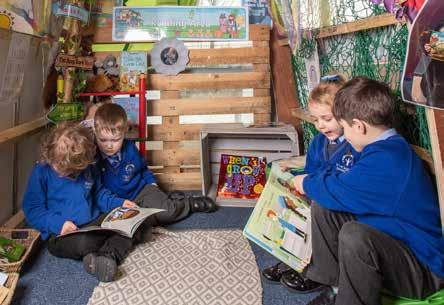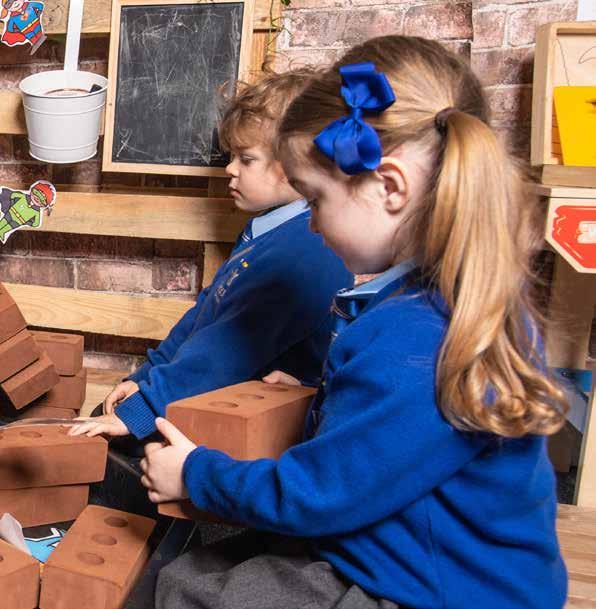
3 minute read
Feature
continued from page 25
“Honestly, it shocked me,” says Sharon. The school is creating opportunities for children to see people working in nongender-typical roles. Male nurses have visited to talk about their job and children have been taken to see the Lionesses, the England women’s national football team, play at Old Trafford.
“Our job is to open their eyes and show there are different options,” says Sharon.
Boys and mental health
While gender inequality has often focused on the experience of girls, the impact of gender stereotypes on boys is no less harmful. Lifting Limits allows space for pupils to discuss some of the things they hear.
“They are surrounded by messages like ‘man up’ and ‘boys don’t cry’. We were able to collectively unpack how that was related to gender and how unfair it was,” says Becca, adding that the “frightening” statistics around men’s mental health, suicide and prison rates illustrate the need to reconsider our expectations of young boys.
While a key focus of Lifting Limits is challenging and changing the maledominated curriculum in schools, Kirsty says that the programme aims to raise awareness among all children that they can take on any role, regardless of their gender.
“If people have very strong views around gender stereotypes, research shows it has a poor effect on mental health,” Kirsty says.
“If you’re thinking ‘I’ve got to be this kind of man or kind of women’, as soon as you deviate from that idea, you think ‘there’s something wrong with me, I’m not good enough.’”
Children are leading the way Hayley says children at Packmoor have developed the confidence to question and challenge stereotypes and bias and are leading the way to change.

In a year 4 class recently when one child stated “girls can’t play football” the others immediately questioned this. “They challenge each other, asking ‘why do you think that?’ It is having a positive impact,” says Hayley. Next month, a group of children will meet with the parent, teacher and friends association to request funding for new reading books. The list – compiled by the children – includes Gerald Wants to Wear Pink, A Different Sort of Normal, Marcus Rashford’s
Books that challenge gender stereotypes
n The Paper Bag Princess Robert Munsch n A Different Sort of Normal Abigail Balfe n The Breakfast Club Adventures Marcus Rashford n Gerald Wants to Wear Pink Becci Murray n Emmeline and the Plucky Pup Megan Rix n My Shadow is Pink Scott Stuart n Mae Among the Stars Roda Ahmed
The Breakfast Club Adventures and ’Twas the Night Before Pride. The books not only subvert ‘traditional’ gender stereotypes, but also those around disability, race and sexuality.
At Barnham CEVC Primary in Suffolk, teacher Tara Cross says class discussions around gender stereotypes have also led to children considering other barriers to equality.

In a year 4 lesson about scientist Katherine Johnson, Tara says a girl pointed out: “She didn’t get the recognition she deserved for her work towards the space mission. This was because she was Black and a woman. If she was a white man, she would have got credit for her work.”
The school is also teaching children about the use of pronouns and the fact that not everyone identifies as the gender registered at their birth. One year 3 child has a parent who is transgender. “For Father’s Day they wanted to draw a dress on their card, and they put the transgender flag inside it. It has been easily accepted by all of their peers.”
Lifting Limits is keen to break the habit in some schools of labelling children by gender and highlight the things children have in common with one another instead.
“Having school structures and routines that highlight gender is saying, girls and boys are different,” says Kirsty, adding that this can encourage unhealthy relationships between children.
One school had a behaviour system in place which involved teachers adding tokens to jars when children displayed good behaviour and giving them a reward when the jar was full. But they had a jar for girls and a jar for boys. “It was creating this really quite toxic competition,” says Kirsty. “You’re pitting a ‘boys versus girls’ narrative. There’s nothing wrong with competition, but what are the defining characteristics you’re using?
“We say to schools, ‘why have you got your water bottles in a girl box and a boy box? Would you have a free school meals box and a non-free school meals box?’ People are aghast at that, but why use gender as a defining characteristic when there are other defining characteristics you wouldn’t dream of using?”
Tara says: “We have changed our uniform policy from separate girls’ and boys’ uniforms to just saying school uniform.”
Doing things differently
While schools have been working hard to open children’s eyes to gender stereotyping, staff too have found they are rethinking some of their own behaviours and use of language.
“I remember having a conversation in a class about the phrase ‘man up’, and how I would find that offensive,” says Becca. “A colleague in the room was surprised about that. I think some staff hadn’t previously given much thought to some sayings.” n Resources for primary schools: neu.org.uk/breaking-mould n Lifting Limits: liftinglimits.org.uk

At Packmoor, Hayley says in the past, when letters were sent home, she would say to children, “give that to your mum”, assuming they were the main carer. She is no longer doing this, and was shocked when she realised the messaging it was reinforcing.
“It’s not about beating yourself up about it,” Hayley says. “It’s thinking, I can do things differently.”
@ArtsmarkAward /Artsmark1





